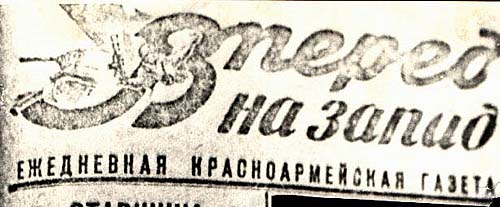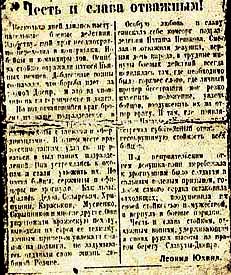|
|

|
Issue 138, Wednesday, October
6, 1943
|
The offensive battles lasted for several days. The malicious enemy counterattacked repeatedly. But Comrade Osinov's fighters and commanders steadfastly deflected the thrust of the drunken Germans. The courageous soldiers realized that it was the fight for their native Dnieper, and that inspired them to heroic feats.
But then the despairing enemy threw a several times stronger force of infantry with tanks and Ferdinands at the detachment. In one place enemy tanks managed to break through to the rear of our detachments. They rushed at the trenches and started "ironing" them. But our fighters, sergeants, and officers didn't waver. Like lions fought Dedov, Skliarevich, Khripushkin, Karas'kin, Musienko, Skrypnikov, and many others. They obliterated enemy infantry, disabled vehicles, by personal example they led the fighters to heroic deeds, without hesitation they gave lives to their beloved Motherland.
 The
detachment's komsorg (KOMSOMOL organizer - trans.)
Natasha Peshkova earned for herself a special love and glory. The brave and
courageous girl, the loyal daughter of the nation, in the difficult minutes
of combat always appeared where an impassioned word was needed, where the personal
example of fearlessness could abruptly change the situation, lead the fighters,
inspire them to repulse the enemy. And where Natasha Peshkova appeared, the
enemy met destructive fire and unbreakable steadfastness of the fighters. Under
the adversary's fire the warrior girl ran over to the almost faltering soldiers
and with an upsurge of strong will, with the voice of heart itself, stopped
those falling back, inspired them with her steadfastness and bravery, and returned
them to the battle formation.
The
detachment's komsorg (KOMSOMOL organizer - trans.)
Natasha Peshkova earned for herself a special love and glory. The brave and
courageous girl, the loyal daughter of the nation, in the difficult minutes
of combat always appeared where an impassioned word was needed, where the personal
example of fearlessness could abruptly change the situation, lead the fighters,
inspire them to repulse the enemy. And where Natasha Peshkova appeared, the
enemy met destructive fire and unbreakable steadfastness of the fighters. Under
the adversary's fire the warrior girl ran over to the almost faltering soldiers
and with an upsurge of strong will, with the voice of heart itself, stopped
those falling back, inspired them with her steadfastness and bravery, and returned
them to the battle formation.
Honor and glory to the steadfast, courageous fighters holding the heights on Slavuta-Dnieper's right bank.
Leonid Yukhvid
![]()
Comments by Natalia Peshkova
* ... I saw all these articles already after the war. Even this corps newspaper of ours didn't reach us, and if it did, it was immediately left for hand-rolled cigarettes. There was no paper, and the newspaper was a valuable which no one was going to distribute.
|
Translated by Oleg Sheremet |
|
|
|
|